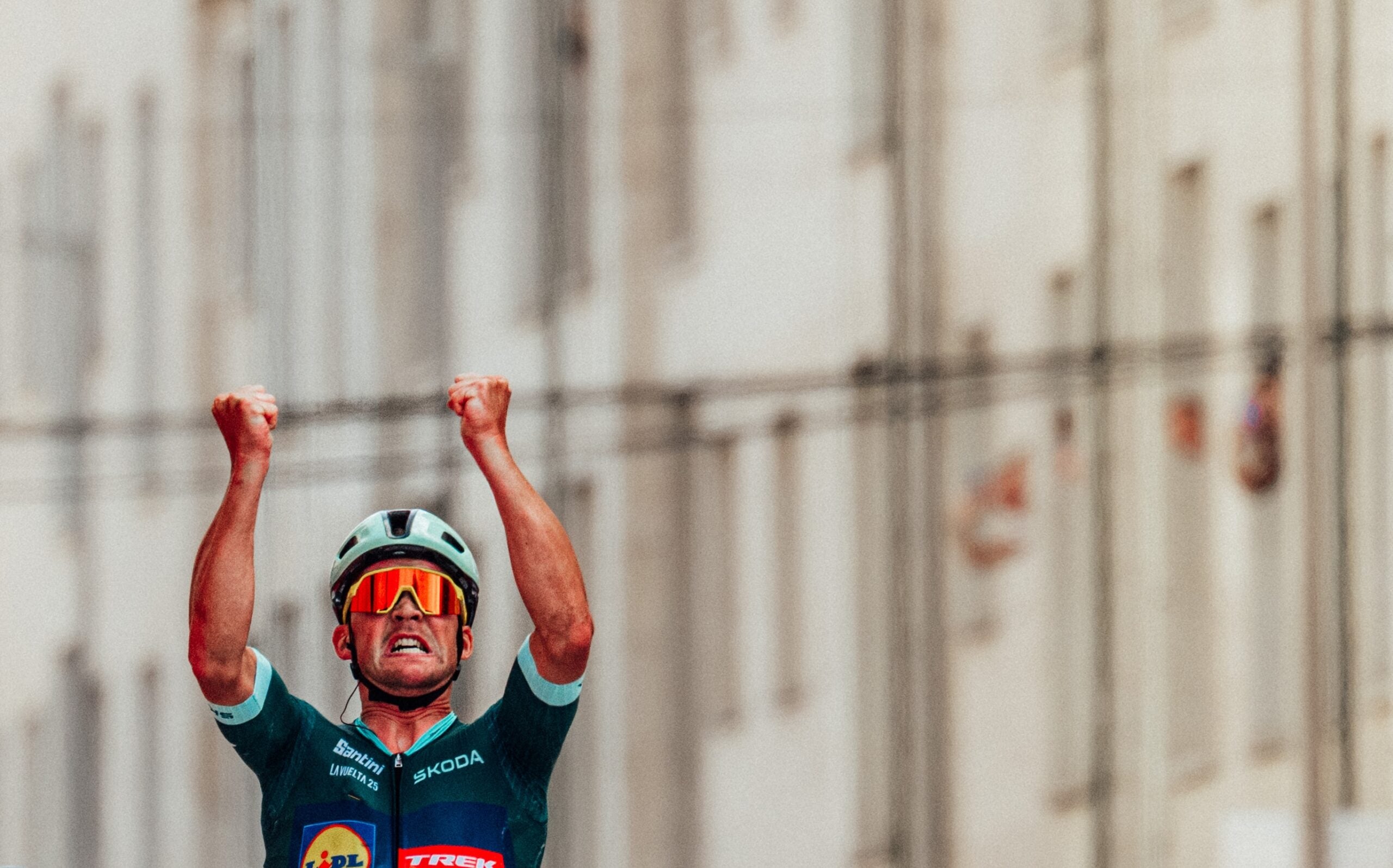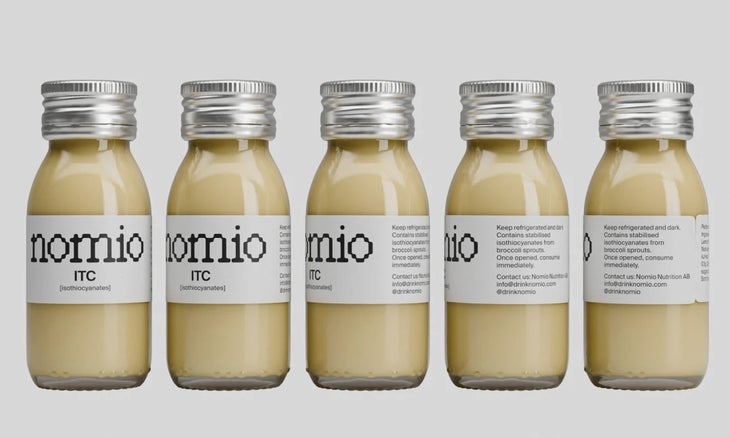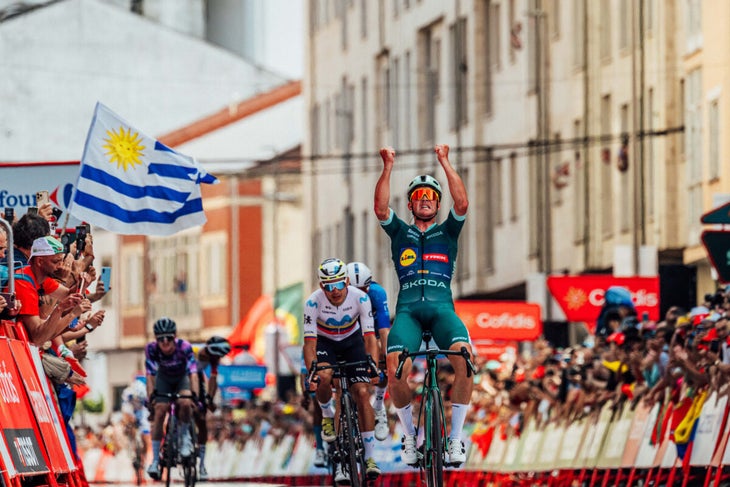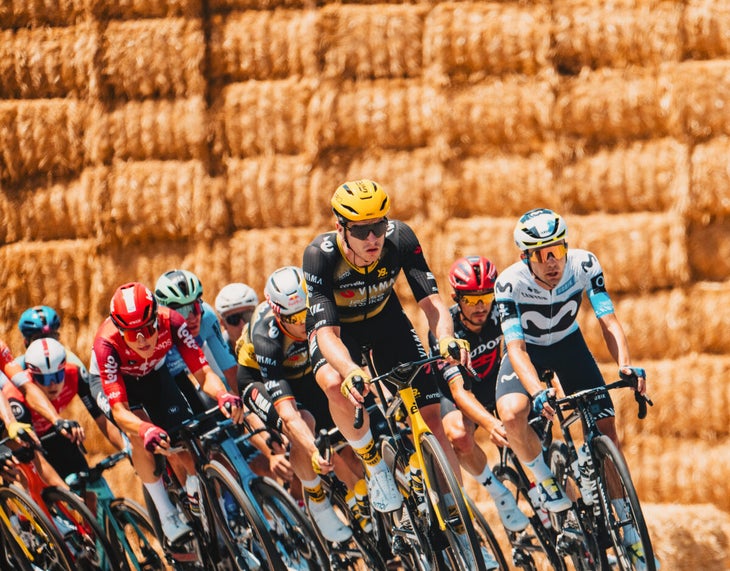‘Our goal is that all athletes at the LA Olympics will be using Nomio’: Investigating a broccoli drink that claims to reduce lactate by 12 percent and is selling big in the WorldTour.

(Photo: Cycling Images / Gruber / Velo )
Updated September 16, 2025 02:29AM
If you want your kids to grow up strong like Mads Pedersen, just tell them to drink their greens.
Pedersen is powering his pulverising 2025 season with “performance-enhancing” broccoli extract shots that are turning the WorldTour green.
“I’ve started using Nomio,” Pedersen said earlier this year on his Lang Distance podcast. “It’s broccoli. Compressed broccoli, which helps reduce your lactate.”
Pedersen explained he fueled his classics rampage on a pre-race cocktail of Nomio, sodium bicarbonate, and Monster energy drink.
That vile-sounding concoction might not catch on.
But, according to Nomio co-founder Emil Sjölander, Lidl-Trek‘s classics-bashing, grand tour-dominating leader is one of thousands of athletes swilling vials of his broccoli performance booster.
“Nomio has garnered an immense elite following in a very short time – only eight months from launch we estimate that 30-50 percent of elite runners and cyclists in Europe use it,” Sjölander told Velo.
“They’re convinced by the strong data we’re showing from real published research papers. But there’s also a distinct feel when you take it which is highly seductive. It’s not dissimilar from when you first start using carbon plate shoes or start riding a very good bike,” Sjölander said.
They’re some bold statements.
Indeed, Nomio is yet another name among many in the wild west of performance supplements. Velo contacted one pro team nutritionist who theorized the broccoli sprout drink put a new meaning to the term “BS.”
But skepticism aside, there’s science behind the superpowers of broccoli sprouts.
Isothiocyanates: The WorldTour’s new super fuel?
 Nomio sells in 60ml shots, packaged into glass bottles. (Photo: Nomio)
Nomio sells in 60ml shots, packaged into glass bottles. (Photo: Nomio)
Nomio was developed over eight years by scientists at the Swedish School of Sport and Health Science and Stockholm’s renowned Karolinska Institute.
They’re the same brainiacs as who blew up the performance potential of nitrate-packed beet juice.
“Team Nomio” boasts suitably academic backing for its cruciferous kingmaker.
The brand website cites studies co-authored by its founders and an independently written paper to back up claims of reduced lactate production, lower oxidative stress, and enhanced recovery.
The key headline?
“A 12 percent reduction in blood lactate and a 10 percent decrease in oxidative stress compared to placebo.”
So what’s the secret?
Isothiocyanates (ITC).
This phytochemical is a key regulator of physical stress that’s found in high concentrations in broccoli.
Nomio says it uses a unique strain of sprout to pack as much ITC into one of its 60ml drinks as would be found in 2.5-3kg of raw broccoli.
Sjölander explained that ITC hyper-stimulates the body’s antioxidant defense system to create an athletic super-boost.
“ITC activates NRF2, which makes you better at handling physical strain. And that’s what endurance sports are about,” he said.
“Positive effects of NRF2 activation include reduced inflammation, more stable blood sugar, and lower lactate. And they all contribute to both performance and recovery.
“It also strengthens the training signal. That means your body gets ‘more motivated’ to create new mitochondria,” Sjölander said, referring to the body’s powerhouses of energy production.
A pricey placebo or a science-backed one-percenter?
 PSA: Drinking Nomio might make you faster but don’t expect to suddenly start winning stages at La Vuelta. (Photo: Cycling Images / Gruber / Velo)
PSA: Drinking Nomio might make you faster but don’t expect to suddenly start winning stages at La Vuelta. (Photo: Cycling Images / Gruber / Velo)
It all sounds too good to be true, right?
But the question on everyone’s lips – how does it taste to swill kilos-worth of raw broccoli?
Well, I tried it, so you don’t have to.
Jokes aside, it’s not too bad.
Nomio mixes lemon juice and sugar into its veggie crush. It gives a bittersweet flavor that’s not great, but no worse than slugging a shot of beetroot concentrate, ketones, or sodium bicarb.
And what of the “seductive impact” of a broccoli boost?
I took Nomio before and after four of my most heinous recent indoor trainer workouts, per the brand’s recommended dosage.
Sadly, I didn’t start popping numbers like those of pavé-pounding Pedersen. But supplementing with Nomio did coincide with a couple of VO2 Max sessions that felt slightly less nauseating, both during and after the workout.
Whether that elusive “chainless” feeling came from Nomio or just from good sleep, better nutrition, or any of the other facets of performance and recovery is another matter.
Lidl-Trek nutritionist Stephanie Scheirlynck told Velo she’s waiting on tests being performed by her medical team before drawing a conclusion on Nomio.
However, she added that if Pedersen believes in the benefit, then there’s no real drawback to his all-natural magic bullet.
Sadly for the unsponsored, Nomio isn’t a placebo you’d take without pause. Nomio is sold in the USA via The Feed for $28 per pack of four.
The price point is equally punchy over here in the UK.
With the brand suggesting two shots on days of racing or intense training, it might be worth just suffering the lactate pain.
The use of glass bottles and a relatively short shelf life adds a further logistical blocker.
‘Our goal is that all athletes going to the LA Olympics will be users of Nomio’
 Nomio says several WorldTour teams are bulk buying its drink, and that dozens of athletes purchase independently. (Photo: Gruber Images / Velo)
Nomio says several WorldTour teams are bulk buying its drink, and that dozens of athletes purchase independently. (Photo: Gruber Images / Velo)
Nomio co-founder Sjölander conceded the drawbacks, but pointed out that they’re not deterring a bunch of the WorldTour from buying in.
Sjölander shared with Velo a list of five WorldTour squads that are buying his broccoli drink in bulk, and claimed he’s seeing orders from individuals on almost every other team in cycling’s top tier.
And while Nomio doesn’t boast any official team partnerships, Canada’s Olympic marathoner Rory Linkletter and Swedish ultra-marathon ace Petter Engdahl join Pedersen in an armada of high-profile ambassadors.
Sjölander believes this is only the start for his bitter-sweet shots.
“We’re fairly confident that ITC will be seen as a natural hack to improving faster in endurance sports. So we haven’t been surprised by the interest from professional teams once they caught up with the science,” Sjölander told Velo.
“Our goal is that all athletes going to the Olympics in LA 2028 will be users of Nomio,” he added.
Will Nomio light up Los Angeles in 2028?
Or will it just be another natural nutrition craze a la beets, quinoa, and cherries?
The research papers – and perhaps also Pedersen’s palmarès – are strong evidence for Nomio.
So if you don’t already, it could be time to learn to love the veggie twang of sprouts.
But if you choose to go without?
It won’t matter more than following a good training program and getting a sound night’s sleep.

